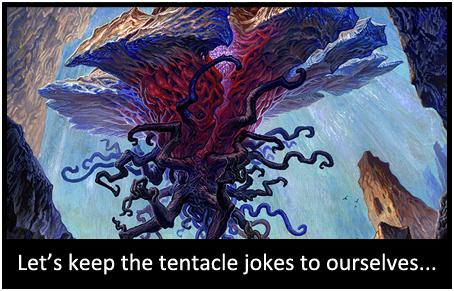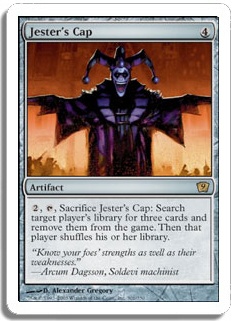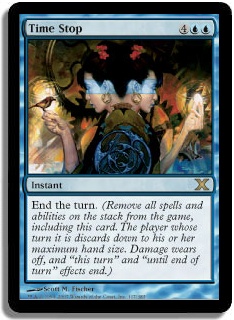
lright, so maybe you
don’t… in general (pun intended). The thing is, problems in life are pretty
much unavoidable. In life and in Magic, it’s important to
minimize the effects of those problems and to deal with them effectively. In EDH,
this is even more important, due to your limited number of resources. Even I suck at this
sometimes. For instance, Johnny, Combo Player only has one Power Artifact in his deck. If you get rid of it (or I let you), you’re getting rid of one
of his (my) infinite mana combos. But how do you get rid of it exactly?
That’s what I’m going to hopefully show you today: That just because
something is powerful doesn’t necessarily mean it needs to be banned, and just because something is unfair doesn’t mean there isn’t a way to overcome
it.
One thing in particular
which has quite a few players’ feathers (or should I say tentacles?)
ruffled is…

Yep. Emrakul, the Aeons Torn. Johnny, Combo Players and Timmy, Power
Gamers everywhere are complaining that this fifteen-mana Eldrazi Titan is “format warping.” That is to say, players who want to ban the card believe that
their meta has become all about “first to cast Emmy wins.” All I’ve got to say to that is, you’re wrong.
Look, putting Jester’s Cap in your deck to deal with Emrakul is no
different from putting Kor Firewalker in your sideboard if you’re running a white weenie deck at an FNM with a bunch of RDW or Big Red decks. Regardless of
what format you are playing, there’s always a metagame.
Now for some of you that term may sound unfamiliar, but don’t worry…
The metagame is more or less another way of saying “the format you’re playing, the decks at the location you’re playing, and the cards you’re running in
your deck, before you shuffle up and draw seven.” In EDH, you might as well add “the tendencies your group has when playing” due to the tightly knit
nature most players in EDH games have. It’s also important to note that no matter the format, the goal is to win the game. Whether that’s through
general damage, or milling all your opponents, or just straight up Overrunning a hundred Saproling tokens and alpha-striking your opponent, the end result
is that there will be at least one loser (more for multiplayer) and at least one winner (more if you’re playing teams).
Why stop the banning at Emrakul? Why not any infinite combo? Why not
Scion of the Ur-Dragon due to Dragon Tyrant? The thing is, just like assembling Power Artifact + Grim Monolith + Ambassador Laquatus, Emrakul is only one
card of a hundred that a player can pull. It also costs a lot more mana than milling everyone with a combo (though some might argue Emrakul is a combo
unto itself), and in my experience, Emrakul has never won a game the second it hit the board unlike the aforementioned power artifact combo; there
has always been time to get rid of it, even after it has attacked. Even better, costing fifteen mana makes Emrakul’s “combo” effect null, as it is often
cheated into play via something like Tooth and Nail giving you a whole additional turn for someone to do something about it. Emrakul can be
disrupted just like any of the above cards and is no more difficult than playing against a mono-blue deck like Azami which is full of counterspells.
In other words, if your meta is running Emrakul, maybe you should be
running answers to Emrakul, rather than tell the player who is playing the Titan that your group is banning it. Let me just go ahead and name one:
Naturalize. Yes, that’s right, Naturalize. Due to the absurd amount of mana
Emrakul
costs, one way to get it out onto the battlefield quickly is mana ramp. There’s a
number
of
ways
to
do
this.
If you leave one of those ways on the battlefield and expect it not to be used, that’s your choice,
but that choice has a consequence, and it might just be Emrakul.
Similar is your choice not to run answers to other certain threats in
your deck. If you don’t run graveyard hate, that’s fine, but not only is that good against reanimator-style decks, but it works against Emrakul’s
reshuffling ability if it’s destroyed.
If you don’t run board wipe, that’s fine, but not only are board wipes
good when you’re behind or when you’re up against a token deck, but it destroys Emrakul, so that the player who did decide to run Relic of Progenitus can
exile it.
My point here is that Emrakul isn’t so much a format warping card as it
is… a meta-problem-exacerbating card. Allow me to spell EDH for you… R.E.S.I.L.I.E.N.C.E. The more answers you have in your deck, the more
likely it is you will win. If those answers are repeatable, then that’s even better. Hence, why Punishing Fire is better than Shock. Even though it
costs one more mana, the ability for it to be repeated basically means it’s another Shock every time you return it to your hand. This fact stays the
same pretty much regardless of format. If you’re playing U/W Control in Standard, you don’t just have to deal with another U/W Control deck. You
have to deal with RDW/Big Red as well.
In EDH, there are cards you can run in your deck which aren’t exclusively
functional against Emrakul and aren’t “sub-par” as compared to what you could be running in its place. No, I’m not going to look up all of them for you
because in the end, the card choices for your EDH decks are up to you, and if you choose not to run an answer to a specific card or deck type, then
you’ll lose.
However, I’ll give you a few of my favorite answers to Emrakul that I
would run in any of my decks (provided I had a deck within the card’s colors, or owned the card)…

1. Jester’s Cap
Believe me, if I owned this card it would be in every EDH deck I own.
It’s an excellent answer to pretty much any card you don’t like… including Emrakul. As I said earlier, this is also extremely devastating to combo
decks, or any deck which uses a specific combination of cards to end the game extremely quickly, such as any of the infinite mana combos so famous in
blue decks, or even Zur’s Empyrial Armor + Necropotence + Reliquary Tower combo. Obviously there are other cards which would fit this category like
Lobotomy, but those only hit for one card at a time.
As such, you should keep them in mind of course, but due to the singleton
nature of EDH, they can’t even hold a candle to Jester’s Cap. To a lesser extent, this can be a catchall for pretty much any card that takes
another card out of an opponent’s library such as Bribery, which actually makes having Emrakul more of a liability in your deck than an asset, and can
also grab for any creature you want. Like casting Verdant Force for five mana? I know I do.
2. Evangelize
Like I said, repeatable removal is one thing that’s probably most
valuable in EDH. The problem with removal in general can be that the creature you want to get rid of has shroud
.
Well look no further my
friends! While the total cost of a bought back Evangelize is nine mana, the ability to essentially steal an opponent’s creature every turn when you
have that mana every turn can be extremely valuable in the late game. With all the board wiping power white has, even token decks can end up getting
their general stolen. Many of the buyback spells are worth running for no other reason than they have buyback and can retain them for a large amount of
time after the dust from a Planar Cleansing settles.
Oh, did I mention this can work on Emrakul? After playing this a couple
of times on an opponent with Emrakul as their only creature you might start to thank the player for playing the card rather than hate them.
3. Rout
Yes, this is obligatory, even though it’s another white card. First, it’s
instant-speed so you can use it to get rid of a hard-casted Emrakul. Seven mana you say? If your opponent can produce fifteen, and you can’t produce
less than half of that, you probably deserve what’s coming to you.
“But it’s one of the only instant-speed removal spells for Emrakul!”
While that may be true, Vedalken Orrery and Leyline of Anticipation both make all your spells instants for lack of another term. The point here is that
board wipes are a good thing to have. Tsabo’s Decree would be like a black version of this that doesn’t require any assistance from the above cards.
4. Time Stop
By far the most “IN YOUR FACE!!!11!1” card to stop Emrakul, is Time Stop.
Yeah, that extra turn you were gonna take? Nah, that’s alright, I’ll go ahead and start mine. However, the meat is in the fact that it works on all
uncounterable spells much like Mindbreak Trap, and if you’re playing 1v1, it’s basically another Time Warp in your deck.
You can also use it as a political card by stopping the player who’s
alpha-striking someone else. I scratch your back, you scratch mine? Definitely. Probably 1/4 of the time I cast this it’s for that reason.
5. Deadly Recluse
I’m only partially joking about this. The truth is, beneath Emrakul’s
giant 15/15 carapace,
it’s just a creature.
It can be killed by deathtouch just as easily as Rout or Day of Judgment. The advantage green
has is that green is really good at producing tokens and ramping mana, which makes the six annihilated permanents kind of irrelevant. There might only
be Quietus Spike, Basilisk Collar, and Gorgon Flail to give your creatures deathtouch, but think about the creatures that have deathtouch that could
be enchanted with something like Arcane Teachings or equipped with Thornbite Staff? Ever tried strapping a couple of
chainsaws onto a motorcycle?
No? Well, it’s something like that.
Now of course all of these are situational, but so is Emrakul. Assuming
you won’t have one of these whenever your opponent gets Emrakul onto the battlefield is redundant, because your opponent isn’t always going to be
able to get Emrakul onto the battlefield. It’s important to have redundant answers like the above because of the nature of Magic. You just have to
be able to answer a wide variety of threats. Not to mention, if I were running a Rafiq of the Many deck, or a Jenara, Asura of War deck, I’d
probably run all of the above cards
.
It’s true though, you can’t answer everything in EDH. It’s pretty much
impossible, especially in multiplayer. In no way am I saying that I expect everyone who reads this to have every answer to every card on hand.
However, the cards in the game aren’t the only thing which influence who wins… What you do also affects the outcome. One example would be how you might
attack with your Mindless Null into the player who controls Plated Slagwurm. Mind games are a huge part of Magic, and faking out your
opponent is the least of them in EDH.
Politics is one thing in the format even I haven’t mastered. However, my
brother has, and as a result, even though his deck is arguably as powerful as any of mine in a multiplayer environment, his win/loss ratio is likely
higher.
Let’s bring this back to the Emrakul example… Say there is player A, B,
and C. Player A cheats Emrakul into play. Player B has no answers, but has the largest board presence. Player C has an answer but doesn’t do
anything about Emrakul. Player C is taking a risk in assuming player A will try
to get player B down to his level. Assume that this happens. As soon as
player B sees that player C had an answer to Emrakul and didn’t do anything about it, player B may remember this for the next game and kill player C
because of that fact alone.
People in my group are like this; we all have a desire to at least get
even with whoever caused us to lose a game. Sometimes this is taken so far as to use every resource available to get rid of that person. If your group is
like this, it’s important to make sure to answer cards like Emrakul in this situation to prevent a loss the next game. Chances are the game I just
made up would’ve continued, and left players A and C as temporary allies to knock player B down a peg or five (assuming player A didn’t react on his
emotions and try to get even with player C).
In EDH, the factor of “politics” doesn’t just go to “look at what he has
over there!” As it’s a game played most often among friends as I said earlier, this can often go as far as distracting them with what you heard about
the latest movie that just came out, or making sure everyone remembers “that one time” someone’s board looked exactly as it does right now, and they ended
up winning.
In the latter, people will probably turn their attention to that player
just “in case” they have a similar way to win. In the case of Emrakul, as such an iconic part of Magic now, most people will remember
its power after getting hit with it once, and everyone will learn to gang up on the card until it is destroyed (or hopefully exiled).
Now, some of these things might seem underhanded or sketchy, but they
happen. They just do. It’s important to realize that they do, because the more
you do, the more you will learn to stop caring about that movie that just came
out, and more about the board state, because in the end, the goal ofMagic as a card game is to win. How you do that is up to you,
but if you choose not to turn certain cards because you feel it’s a “cheap” way to win, or because you feel you shouldn’t have to run X card,
then that’s your prerogative. Your goal while playing the game might also to have fun, and by and large that is more important than winning; even I,
as a Spike, agree with this.
However, if you don’t care about winning, then why should you care about
losing, especially to something like Emrakul, which you chose not to run card X as an answer to?
I’m not trying to turn my readers into Spikes, and ultimately whether or
not your group chooses to house-ban Emrakul isn’t my choice. However, like ganging up on Johnny, Combo Player, ganging up on a card that someone
enjoys playing to the point of a ban is no better.
The people that created the EDH format take great care to make sure it
stays balanced, as is shown by Sheldon’s (what I assume is)
quarterly updates
(notice that the date there is months after ROE was released). I trust
their judgment, and I think you should too.
With that, work on getting a Jester’s Cap or three for your EDH decks; I
know I definitely will be.

